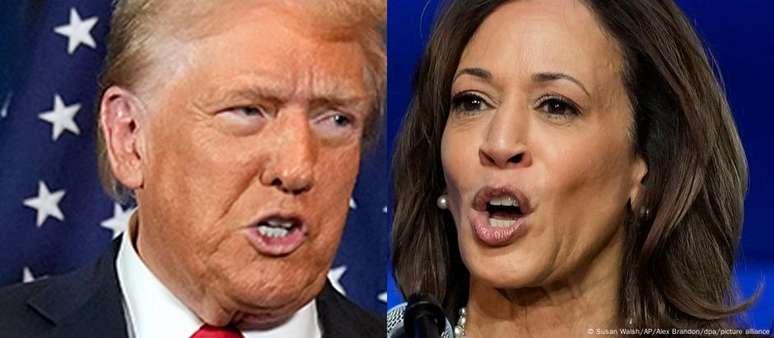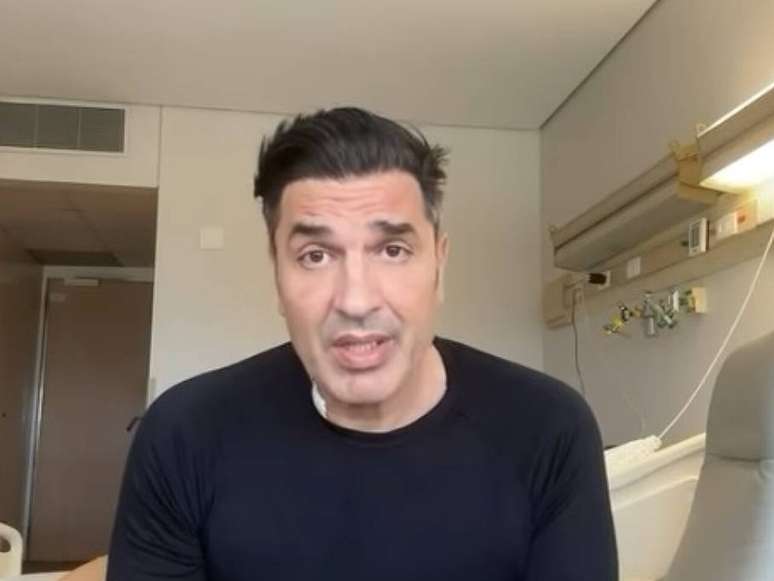The outcome of the bitter dispute between Trump and Harris will have effects far beyond the borders of the USA. Analysts predict how the elections will affect Bolsonarism, trade and environmental partnerships with Brazil. No election controversy is followed by the world with as much attention as that of the White House. The office of President of the United States carries great political, economic and military power, and its decisions have effects far beyond its borders.
Tuesday’s elections (05/11) are of particular concern: the Democrat Kamala Harris and the Republican Donald Trump are in technical parity in the polls, and Trump has already demonstrated in his previous mandate his disruptive potential for democratic stability and the fight against climate change.
For Brazil, the impact of a Trump victory should be significant: strengthening of the far right, reduction of funding and partnerships in the environmental sector, trade obstacles and pressure on the partnership with China are some of the effects mentioned by experts interviewed by DW .
In the case of a Harris victory, the tendency is to maintain a lukewarm relationship between Washington and Brasilia, without great ambitions related to South America, but as usual and with agreements for the defense of liberal democracy and the protection of the environment.
It’s no secret who the Brazilian government’s preferred candidate is. In early June, President Luiz Inácio Lula da Silva said he was rooting for US President Joe Biden to win; three weeks later, he dropped his re-election bid in favor of Harris. Trump, on the other hand, supported Jair Bolsonaro’s re-election in 2022, saying that Lula was a “radical left lunatic.”
Democracy and the far right
The United States is a point of reference for many in Brazil and the result of the American political dispute sometimes affects the Brazilian political scene. An example: in November 2016 Trump was elected president for the first time; two years later, Bolsonaro won in Brazil. In January 2021, Trump supporters unhappy with his defeat invaded the Capitol; again after two years, the Bolsonarists, outraged by their electoral failure, invaded Congress, the Planalto Palace and the Federal Supreme Court.
This year, Trump’s campaign has been more explicit than in 2016 in authoritarian proposals, such as using state institutions and the military against his opponents. And if he is elected, he will strengthen the position of the far right around the world, including in Brazil, political scientist Maria Hermínia Tavares, a retired USP professor and senior researcher at Cebrap, tells DW.
“A Trump victory will further diminish the ability of liberal democracies to cope with the rise of authoritarian regimes and far-right movements,” he says. “There is a clear influence and common language in these movements, and a Trump victory strengthens the far right in Brazil, which is already strong.”
A possible success for Trump in 2024 will bring a wind of hope for Bolsonarism in 2026, adds Roberto Goulart Menezes, professor of international relations at UnB and researcher at the National Institute of Science and Technology for United States Studies (INCT- INEU). .
“There is a clear link between the hard core of Bolsonarismo and the far right in the United States. If he were to take over the White House, this network would be further consolidated,” he says, citing Eduardo Bolsonaro’s connections with Trumpism and recalling that he became considered by Bolsonaro to be Brazil’s ambassador to the country.
If Harris wins, the trend would be toward less instability in Brazilian and Latin American democracy as a whole, Menezes says. “The Biden government was decisive so that Bolsonaro did not triumph with the coup in Brazil: it mobilized for months to ensure that Brazil did not go astray.”
Climate change partnerships
A point of convergence between the two current governments is the defense of the environment. The Lula and Biden administrations have signed partnerships for climate initiatives, and the White House has announced a plan to donate $500 million to the Amazon Fund over five years, of which $53 million has already been transferred.
The total amount announced by the United States is more than what Norway, Germany and Petrobras have donated to the Amazon Fund in 14 years, Menezes says. If Trump wins, the trend would be to dissolve these environmental partnerships. “Trump pulled the United States out of the Paris Agreement,” he recalls.
The two current governments have also advanced negotiations on the green economy, seeking to align the goals of Biden’s Green New Deal with those of Lula’s Ecological Transformation Plan, and these conversations should continue under a possible Harris government, Menezes says. So far, however, little concrete has been announced, such as American investments in the extraction of critical minerals.
“For Brazil, this cooperation in the environmental field is very important, both in terms of resources and technical-scientific partnerships,” says Tavares. If Trump wins, he predicts these actions will be stopped. “Trump is not only very nationalistic and isolationist, but also an environmental denier.”
Foreign trade
The United States is the second most important destination for Brazilian exports. In 2023, the country purchased $37 billion from Brazil, second only to China, which purchased $104 billion in the same period, according to Comex Stat data.
The export profile of the two countries is also different. While the sale of raw materials predominates in China, in the United States semi-finished or finished products are also sold, explains Menezes. Among the ten categories of most exported items in China are all agricultural or mineral raw materials, while the same ranking for the USA also includes machinery and equipment, aircraft and chemical products. However, trade relations with China represent a surplus for Brazil and a deficit with the United States.
In terms of direct investments in Brazil, Americans are in the lead, with a stock of 246.3 billion dollars in 2022, about a quarter of the total, according to a study by Apex Brasil published this year, when trade relations between the two countries have turned 200 years old.
“The United States is not directly involved in the process of deindustrialization of the Brazilian economy, as is the case with China,” Menezes says. Nonetheless, the White House has no more ambitious plans or trade deals in mind for Brazil or Latin America, and that is unlikely to change, either under Trump or Harris. “We are not a world-class space for the US,” he says.
The biggest change in this field should occur after a possible victory for Trump, who promised during the election campaign to linearly increase import tariffs by 10 percentage points. For Tavares, if access for Brazilian products to the American market becomes difficult, Brazil will tend to divert an even greater share of its foreign trade to Asia.
Proximity between Brazil and China
By the way, Brazil’s relationship with China is another point that could be at the center of tensions if Trump wins. Washington considers Beijing an adversary and has adopted aggressive trade and regulatory policies to try to contain the Asian power’s expansion.
Meanwhile, the relationship between Brazil and China is deepening. The country became Brazil’s main trading partner in 2009 and has consolidated this position. The two are members of BRICS and Beijing has tried to convince Brasilia to join its global infrastructure development program, the Belt and Road Initiative.
“China is entering Brazil with everything, and is also starting to enter academic and scientific cooperation. But I have the impression that the American democratic establishment has not noticed this yet,” says Tavares.
Already under Trump, a possible tightening of the United States on the issue tends to push Brazil even further towards China. “The Brazilian left already has a tradition of a certain anti-Americanism, and a Trump victory will strengthen these sectors, which will say: ‘let’s go to the BRICS, they are more important than other international coalitions’. I don’t think this is necessarily a good thing.”
Menezes also estimates that the Trump administration will tend to put more aggressive pressure on Brasilia to rethink its relationship with Beijing. He cites as an example the White House’s decision to “warn” Peru last October about granting the Chinese infrastructure works in its territory, the jewel of which is the new overseas port of Chancay. The port will be inaugurated in November in the presence of Chinese President Xi Jinping, who will then visit Brazil and meet Lula.
Lack of ambitious projects
Whoever wins, Brazil will have to stay off the White House’s priority radar, which faces other more pressing international challenges such as China, illegal immigration through Mexico and the war between Israel and Hamas.
The last Summit of the Americas, held in Los Angeles in 2022, was “empty”, recalls Menezes, and the White House continues without having an ambitious agenda for Latin America. It is symptomatic that, during his mandate, Biden has not made any trips to Brazil: he is expected to participate in the G20 summit in Rio de Janeiro, on 18 and 19 November, but he has not yet confirmed his presence.
“When it comes to Latin America for the United States, that means Mexico, a part of Central America, because of Cuba, and trouble-making countries, like Venezuela. Other than that, government interest is low “, says Tavares.
But he stresses that exchanges between the two countries are much broader than the interaction between the two governments, and involve a network of “dense and important” relationships between civil society and academia – not to mention the great Brazilian interest in the country as tourist destination and cultural and value reference.
Source: Terra
Rose James is a Gossipify movie and series reviewer known for her in-depth analysis and unique perspective on the latest releases. With a background in film studies, she provides engaging and informative reviews, and keeps readers up to date with industry trends and emerging talents.







